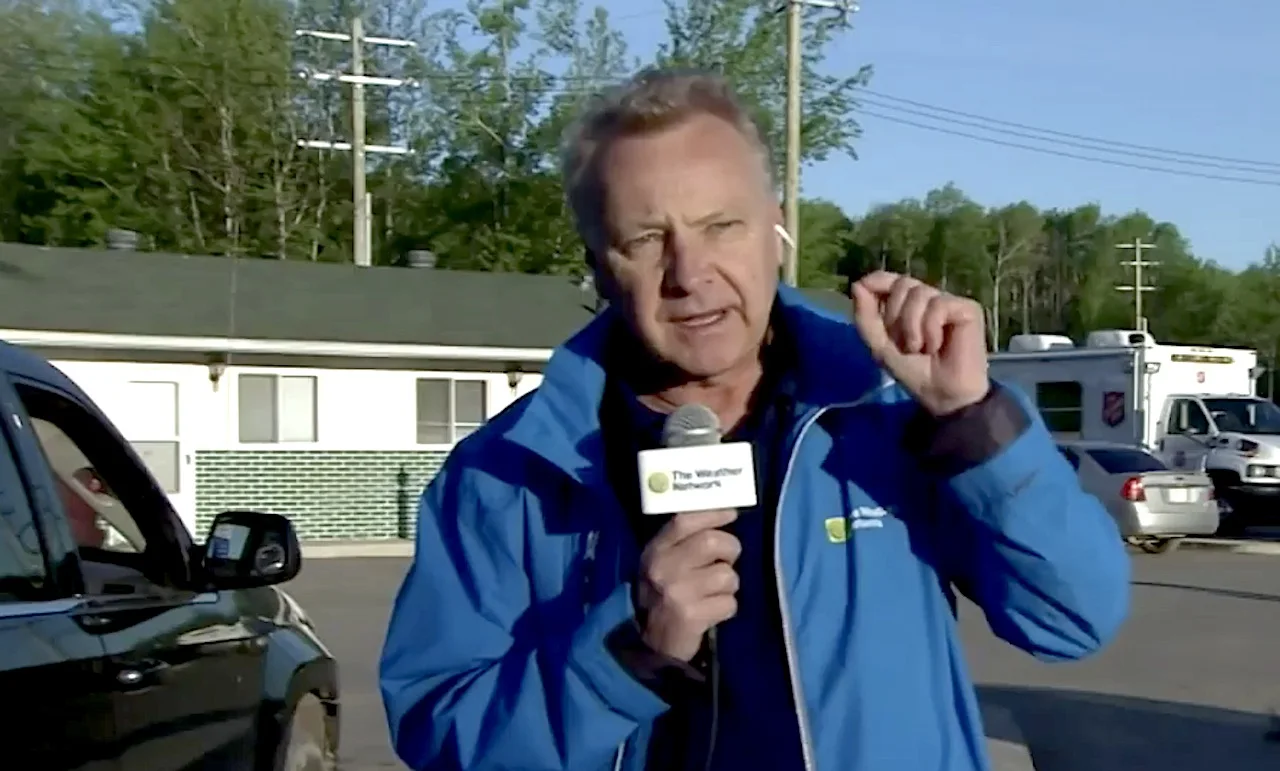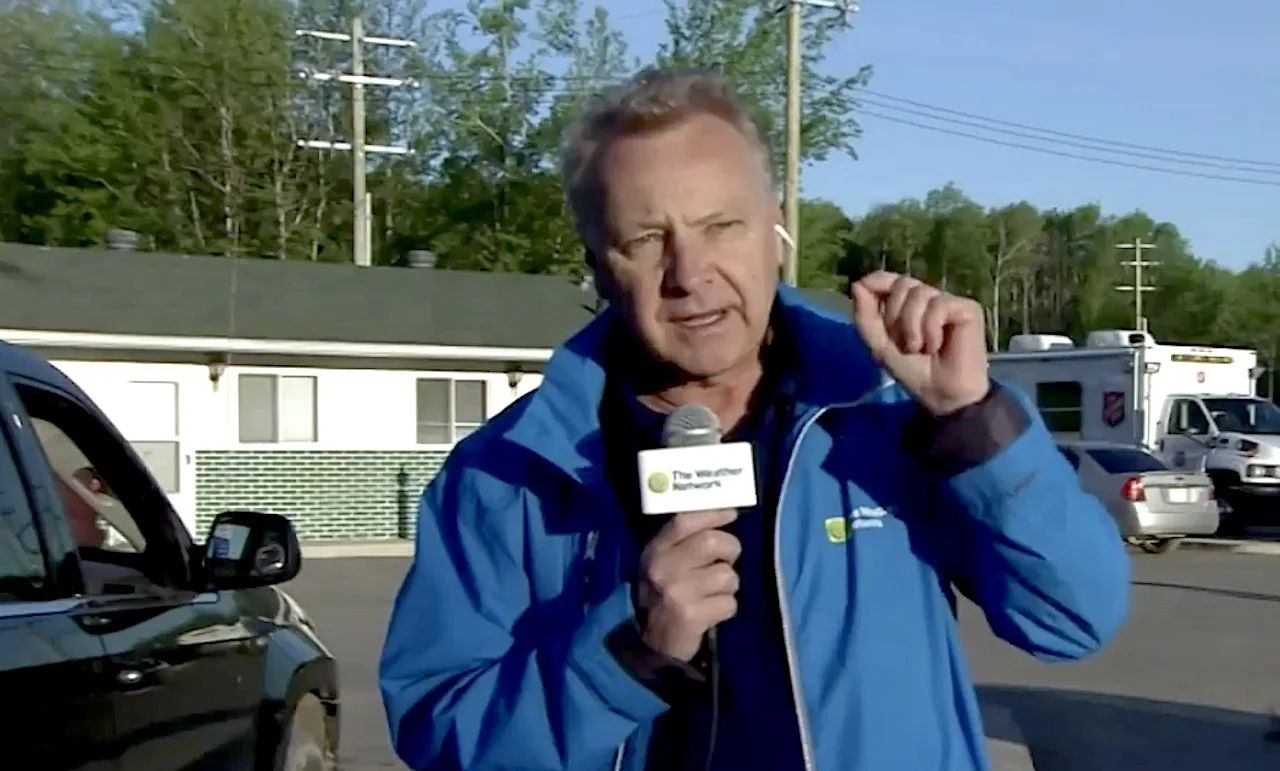
Farewell forecast: Chris St. Clair closes door on legendary career
After 26 years of weather reporting at The Weather Network, Chris St. Clair gave his farewell forecast on Sunday, July 25.
For Chris St. Clair, telling stories is just as much a part of him as the clothes on his back.
Joining The Weather Network as a presenter in 1995, St. Clair has experienced and shared stories on the worst of what Mother Nature can dish out -- from nor'easters and the devastating wildfire in Fort McMurray, Alta., to powerful hurricanes such as Sandy and Irma.
SEE ALSO: The rich 150-year history of the Meteorological Service of Canada
After all the impactful stories he has brought to Canadians over the years, St. Clair closed the chapter on his distinguished career -- now retired after his final TV appearance on Sunday, July 25.
"It’s really bittersweet to leave. I’ve been telling stories about Canada, Canadians and our shared weather experience for 26 years," said St. Clair, on stepping down from job as a weather presenter.
He said he will miss crafting the story, making it inclusive and enticing to a national audience while bringing critical information to "the eyes that need to know."
"That was the challenge and the best part of the storytelling. I will miss it tremendously," St. Clair added.

Chris St. Clair live on location. (The Weather Network)
ST.CLAIR'S ROOTS IN BROADCASTING BEGAN IN 1977
The veteran weather presenter's career can be traced back to 1977, working at CJCH-FM in Halifax, N.S., when he was still in high school -- the all-night show on the weekends. This was where he learned about the art of storytelling from "some great communicators," St. Clair said.
"There is a perfect balance of informal information, humour and humility in crafting an engaging tale. I soaked up loads from some in Canada's best. I was also the director of programming for several radio stations over a 12-year period, and that allowed me to understand audience expectations and desires," said St. Clair.
When St. Clair was contacted by The Weather Network in 1995, he had just received his commercial pilot’s license. "It was a perfect union," he said, with "my love of aviation, (weather) geography and media storytelling."
Creating a thematic story that could run over an extended period -- three consecutive TV segments -- was a wonderful challenge to craft, he stated.
"I needed to interest all and inform those most impacted by the weather. Always for me, the weather and those in the weather were the story," said St. Clair.
WHEN HE FIRST JOINED THE WEATHER NETWORK
He recalled his early days at The Weather Network, noting there weren’t many commercials, but there was a lot of weather. The tools to illustrate the story were "rudimentary," however, including satellite, radar and hand-drawn maps.
"The internet was still an infant. Cell phones were the size of bricks. The idea of taking a video on your phone and texting it to me wasn’t a thing, yet. That one thing, though, revolutionized everything, [but] it wouldn’t happen until after 2012," said St. Clair.
ST. CLAIR'S GREATEST STORIES
The most important story St. Clair has covered is going to be the "greatest story of all our lives," and that is climate change, he said, noting he was behind it as a significant issue 15 years ago.
"I’ve interviewed David Suzuki numerous times, Jane Goodall. I will go on covering this story on various platforms over the coming years. Our future depends on what we do right now," said St. Clair.
Meanwhile, the greatest Canadian story he has covered was the Fort McMurray, Alta., wildfire in May 2016. The 10-day period St. Clair spent in Alberta was "hands down" the best television he has ever done and what The Weather Network offered to him, he recalled.
Camera operator, Shawn Legg, met St. Clair at 10 p.m. local time at the airport in Edmonton on the day of withdrawal from Fort McMurray. The two went to a hotel across from the airport, and it smelled of smoke from the guests, those who had fled.
"We interviewed them, uploaded the stories, got up at 3 a.m. and drove to Fort Saskatchewan, Alta. Everywhere there were gas cans filled, packages of food, diapers, blankets...anything a refugee could need," said St. Clair. "It became instantly clear [that] all these people were refugees, perhaps climate refugees in our own country."
Legg and St. Clair stayed in Wandering River, Alta., about an hour from Fort McMurray. They recorded the morning show from there for a week. Every day The Weather Network became a "conduit for refugees with only the clothes on their backs to reach out to friends and family to let them know they were OK," he said. "It was a supreme honour to be with those people," added St. Clair.
Farther up the road was a station with donated supplies and fuel. Legg and St. Clair recorded from there on one of the days. The Weather Network presenter described the men manning the station as "burley, big oil workers."
"They all cried and hugged on camera as we shared stories about families who they helped. Never in my life have I felt more pride in my fellow Canadians. No political or social bias -- [it was] people helping people. It was profound for me," St. Clair said.
Another particularly memorable moment for St. Clair happened a few years in Newfoundland, where he and Mark Robinson, Storm Hunter and a meteorologist at The Weather Network, became stranded there for a week.
"The winds shifted sea ice and trapped several whales. We drove to Old Perlican, N.L. to see. What we saw was heartbreaking. A whale as big as a (recreational vehicle) was surrounded by ice. Its own body weight crushing its internal organs," recalled St. Clair.
"Mark and I reported on it, then stayed for several hours to be with it as it died. Things we don’t think about every day, how weather impacts life other than our [own]."
EVERY WEEKEND CAPTURED FOND MEMORIES
At the end of the day, after the years of hardships and triumphs St. Clair has seen and reported on, his favourite memories were made every weekend on TV, he stated.
"[It was] every time I could travel [across] our country during crap weather to connect with Canadians who equally love and hate it, but secretly relish it. The complaining about it is half the romance, isn’t it?" said St. Clair.
"We all love it. We revel in it. We rejoice in every signal it gives up. We know it and often won’t admit it, but we love all of it. Our weather...it’s the best in the world," added St. Clair...signing off.
Find Nathan Howes on Twitter.
